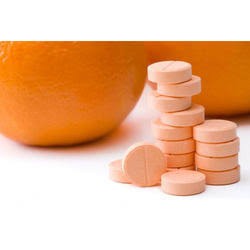Ascorbic acid – vitamin C occurs naturally in foods such as citrus fruit, tomatoes, potatoes, and leafy vegetables. Vitamin C is important for bones and connective tissues, muscles, and blood vessels.
Vitamin C also helps the body absorb iron, which is needed for red blood cell production. Ascorbic acid is used to treat and prevent vitamin C deficiency.
Smoking can make ascorbic acid less effective.
Dose needs may be different during pregnancy or while you are breast-feeding a baby. Do not use ascorbic acid without your doctor’s advice in either case.
Drink plenty of liquids while you are taking ascorbic acid. The chewable tablet must be chewed before you swallow it. Ascorbic acid gum may be chewed as long as desired and then thrown away.
Do not crush, chew, or break an extended-release tablet. Swallow it whole. Measure liquid medicine with a special dose-measuring spoon or medicine cup. If you do not have a dose-measuring device, ask your pharmacist for one.
Keep the orally disintegrating tablet in the package until you are ready to take it. Use dry hands to remove the tablet and place it in your mouth. Do not swallow the tablet whole. Allow it to dissolve in your mouth without chewing. Swallow several times as the tablet dissolves.
Store ascorbic acid at room temperature away from moisture and heat. Do not stop using ascorbic acid suddenly after long-term use at high doses, or you could have “conditional” vitamin C deficiency.
Symptoms include bleeding gums, feeling very tired, and red or blue pinpoint spots around your hair follicles. Follow your doctor’s instructions about tapering your dose. Conditional vitamin C deficiency can be difficult to correct without medical supervision.
Stop using ascorbic acid and call your doctor at once if you have: joint pain, weakness or tired feeling, weight loss, stomach pain; chills, fever, increased urge to urinate, painful or difficult urination; or severe pain in your side or lower back, blood in your urine.
Common side effects may include:
heartburn, nausea, diarrhea and stomach cramps.
haleplushearty.blogspot.com


